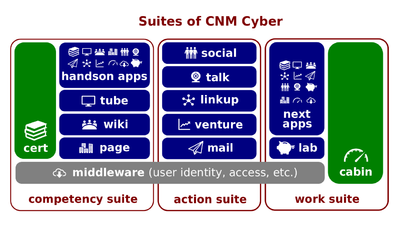Difference between revisions of "CNM Cloud Deployment"
(→Key terms) |
|||
| Line 6: | Line 6: | ||
===Key terms=== | ===Key terms=== | ||
| − | |||
| − | |||
| − | |||
| − | |||
:'''[[Cloud]]'''. In [[informational technology]], a shared pool of configurable computing resources (both [[hardware]] and [[software]], e.g., networks, servers, storage, applications, and services) that are located at a remote physical location managed by an [[Internet hosting provider]] or a [[vendor]] rather than on the client's premises. | :'''[[Cloud]]'''. In [[informational technology]], a shared pool of configurable computing resources (both [[hardware]] and [[software]], e.g., networks, servers, storage, applications, and services) that are located at a remote physical location managed by an [[Internet hosting provider]] or a [[vendor]] rather than on the client's premises. | ||
:*'''[[Public cloud]]'''. The cloud infrastructure is provisioned for open use by the general public. It may be owned, managed, and operated by a business, academic, or government organization, or some combination of them. It exists on the premises of the cloud provider. | :*'''[[Public cloud]]'''. The cloud infrastructure is provisioned for open use by the general public. It may be owned, managed, and operated by a business, academic, or government organization, or some combination of them. It exists on the premises of the cloud provider. | ||
Revision as of 23:31, 8 September 2020
Model of CNM Cloud (hereinafter, the Lectio) is the lesson part of the CNM Cloud Essentials lesson that introduces its participants to CNM Cloud. This lesson belongs to the Introduction to CNM Cloud session of the CNM Cyber Orientation.
Content
The predecessor lectio is What CNM Cloud Is.
Key terms
- Cloud. In informational technology, a shared pool of configurable computing resources (both hardware and software, e.g., networks, servers, storage, applications, and services) that are located at a remote physical location managed by an Internet hosting provider or a vendor rather than on the client's premises.
- Public cloud. The cloud infrastructure is provisioned for open use by the general public. It may be owned, managed, and operated by a business, academic, or government organization, or some combination of them. It exists on the premises of the cloud provider.
- Private cloud. The cloud infrastructure is provisioned for exclusive use by a single organization comprising multiple consumers (e.g., business units). It may be owned, managed, and operated by the organization, a third party, or some combination of them, and it may exist on or off premises.
- Hybrid cloud. The cloud infrastructure is a composition of two or more distinct cloud infrastructures (private, community, or public) that remain unique entities, but are bound together by standardized or proprietary technology that enables data and application portability (e.g., cloud bursting for load balancing between clouds).
Script
- In informational technology, the cloud is a pool of computing resources that are located at a remote physical location rather than on their owner's premises.
- The CNM Cyber Workforce is a distributed grouping of people. Its headquarters are virtual; its physical premises don't exist. Thus, the cloud is its only option.
- The clouds are deployed using one of three models: private, public, or hybrid. What cloud is CNM Cloud?
- The private clouds serve only their owners. Initially, CNM Cloud was a private cloud. That was why it was called the cloud.
- Several years ago CNM Cloud was moved to a public cloud primarily to cut costs. Currently, CNM Cloud is hosted with other platforms and systems that other organizations run.
- Hybrid clouds combine private and public resources. When the CNM Cyber Team launches training on the cloud, the CNM Cloud may be extended to the hybrid cloud to accommodate hands-on training.
CNM Apps is the successor lectio.
Questions
Lectio quiz
- The answer is recorded for the lectio completion purpose:
- Which statement below is correct:
- All of the other substantive answers are correct.
- None of the other answers is correct.
- Which statement below is correct:
